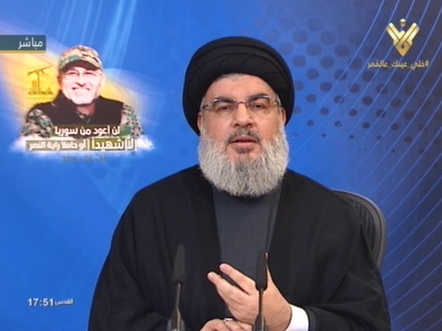 Hezbollah Secretary General Hassan Nasrallah Friday derided U.S. sanctions against his the party’s finances, saying that the law would not have any financial impact because the group receives its funding from Iran.
Hezbollah Secretary General Hassan Nasrallah Friday derided U.S. sanctions against his the party’s finances, saying that the law would not have any financial impact because the group receives its funding from Iran.
In a televised speech marking the passing of 40 days since the killing of Hezbollah’s top commander Mustafa Badreddine in Syria he said Hezbollah entirely rejected the U.S. sanctions, calling them an attack on the country’s sovereignty.
“We totally reject this [U.S.] law until the Day of Judgment. … Even if the law is applied, we as a party and an organizational and jihadi movement, will not be hurt or affected,” Nasrallah said
“The law will not have any financial impact on Hezbollah. I have said before that we do not have commercial or investment projects and commercial institutions that operate through banks,” he said, addressing a Hezbollah memorial ceremony for Badreddine at a complex south of Beirut via video link.
Although Iranian support for his group has for long been a well-known fact, Nasrallah declared for the first time that Hezbollah is receiving its money and arms from Iran. “As long as Iran has money, Hezbollah has money. … Can we be any more frank than that?” he said.
“Hezbollah’s budget and its expenses are coming from the Islamic Republic of Iran. … Our allocated money is coming to us in the same way we receive our rockets with which we threaten Israel,” Nasrallah said, drawing cheers from the crowd. “No bank in the world can prevent money reaching us.”
He thanked Iran’s supreme leader Ayatollah Ali Khamenei, its president and its government for their “generous support” for Hezbollah during the years of resistance against Israeli occupation of south Lebanon that ended in 2000.
However, Nasrallah warned against Lebanese banks targeting Hezbollah’s supporters.
“Some banks in Lebanon went too far and they became more American than the Americans themselves. They even did something that the Americans did not ask for. They targeted people and charitable foundations that were not mentioned in the U.S. list,” Nasrallah said, in a possible reference to a sanctions list designated by the U.S. Treasury Department’s Office of Foreign Assets Control.
The U.S. labels Hezbollah a “terrorist organization.
“There are some banks, that if a person is related to a Hezbollah member, they will close their accounts. This is an attack on charitable foundations and our people and we reject this attack, and we will not allow it. Whoever says they care about the financial sector, they shouldn’t target a third of the population,” he added.
Nasrallah said Hezbollah has started a dialogue with Lebanese officials on the basis of rejecting the U.S. law. “We are open to any dialogue to solve this [U.S. sanctions] file,” he said.
Nasrallah’s remarks come around two weeks after a bomb blast targeted the Beirut headquarters of BLOM Bank, the second largest bank in the country.
Several parties were quick to point the finger at Hezbollah over the bombing due to the fact that the attack coincided with the row with the banking sector.
Nasrallah did not mention in his speech the June 12 bombing of BLOM Bank, which was among the financial institutions in the country that froze Hezbollah-linked accounts. Hezbollah also not commented on the bombing, which was seen as targeting the entire banking sector and a serious escalation of a crisis over the implementation of the U.S. sanctions against Hezbollah’s finances.
The U.S. law, which went into effect in March, threatens to bar from the American financial market any bank that knowingly deals with Hezbollah or institutions or persons affiliated with the group.
In his speech, Nasrallah touched on his party’s involvement in the 5-year-old war in Syria, disclosing that Hezbollah has lost 26 fighters this month in the battle for Aleppo. He vowed to increase the group’s presence in the northern Syrian province, which he said determined the fate of the entire region.
He also said the fate and future of Lebanon cannot be separated from those of Syria and Iraq, defending his party’s intervention in their conflicts. “We will increase our presence in Aleppo, and what is needed is for everyone to be there now, because the real war is there,” he said.

Leave a Reply
You must be logged in to post a comment.